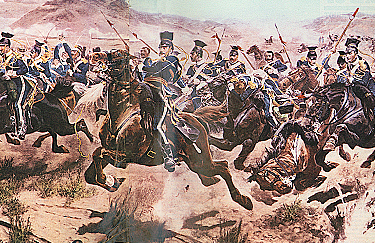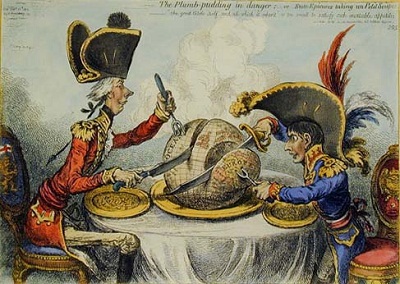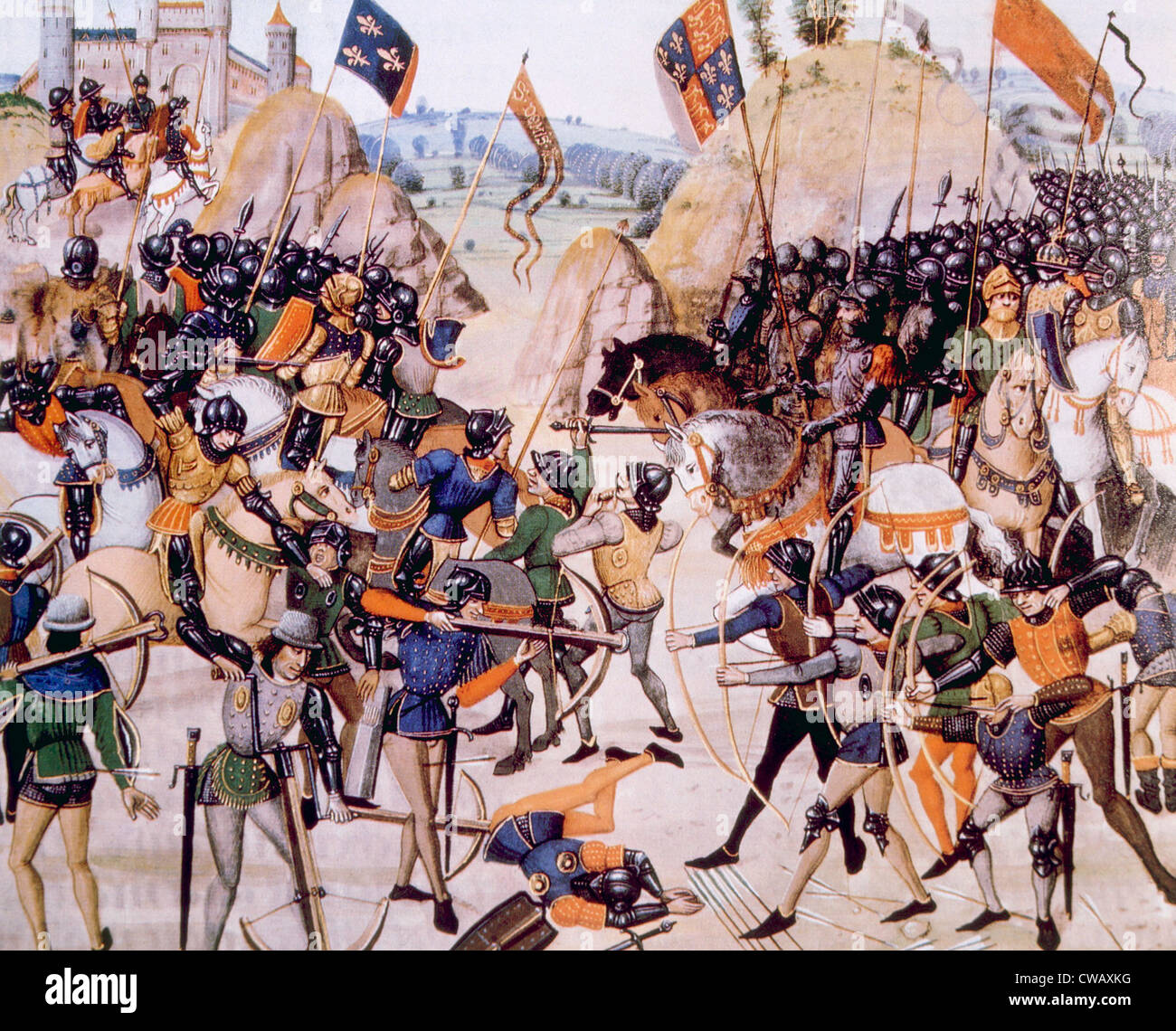Great Military Battles in History
Moderator: Community Team
Re: Great Battles in History
Is “The Crimean War” a “Great Battle”?
-

 jimboston
jimboston
- Posts: 5252
- Joined: Tue Sep 11, 2007 2:45 pm
- Location: Boston (Area), Massachusetts; U.S.A.















Re: Great Battles in History
He also cited the Irish War of Independence as a battle, couldn't be arsed to correct him though.
I think the greatest battle ever was World War 2, closely followed by Tyson Fury's trilogy win over Deontay 'The Chump' Wilder.
I think the greatest battle ever was World War 2, closely followed by Tyson Fury's trilogy win over Deontay 'The Chump' Wilder.

https://www.unicef.org.uk/donate/children-in-gaza-crisis-appeal/
https://www.savethechildren.org.uk/how-you-can-help/emergencies/gaza-crisis
-

 bigtoughralf
bigtoughralf
- Posts: 1802
- Joined: Thu Aug 19, 2021 8:49 am





Re: Great Battles in History
-----------Even The battle of Balaclava, or Charge of The Light Brigade ...October 25th 1854 A.D....Sure the British held on...Even Wiki(the professor's goto  ) gives the Victory to the Russians in that Valley...Yet that is left out of the Professor's report....It is the most remembered part of the battle...It was kinda of like the Battle of Bunker Hill in the Revolutionary War...The British held the field....But Only because the Americans ran out of ammo...Both battles...The Americans and Russians beat the crap out of the British...Then left....Kind of like a sorta Guerilla Warfare....In one battle.... ...
) gives the Victory to the Russians in that Valley...Yet that is left out of the Professor's report....It is the most remembered part of the battle...It was kinda of like the Battle of Bunker Hill in the Revolutionary War...The British held the field....But Only because the Americans ran out of ammo...Both battles...The Americans and Russians beat the crap out of the British...Then left....Kind of like a sorta Guerilla Warfare....In one battle.... ...  ConfederateSS.out!(The Blue and Silver Rebellion)...
ConfederateSS.out!(The Blue and Silver Rebellion)... 
-

 ConfederateSS
ConfederateSS
- Posts: 3363
- Joined: Wed Dec 31, 2008 1:50 pm
- Location: THE CONFEDERATE STATES of AMERICA and THE OLD WEST!
























 7
7 2
2



Re: Great Battles in History
Why do I need to cite every detail? That is not needed, because:
1) Ralph ignores the lessons offered (and forgets what he posts);
2) jim-boi does not agree with me, no matter what I post;
3) ConfedSS with use of shrill and hyperbole will stress minor points; (Yes, I know of Tennyson's poem; so what?)
4) All three will ignore the Big Picture because they are myopic.
5) All three will want to nit-pick because they only know how to deal with minutia.
6) For those willing to learn, they can look up details and information, as needed or desired. The THREE myopic ones must yet not learned of the Internet search engines, such as Google.
1) Ralph ignores the lessons offered (and forgets what he posts);
2) jim-boi does not agree with me, no matter what I post;
3) ConfedSS with use of shrill and hyperbole will stress minor points; (Yes, I know of Tennyson's poem; so what?)
4) All three will ignore the Big Picture because they are myopic.
5) All three will want to nit-pick because they only know how to deal with minutia.
6) For those willing to learn, they can look up details and information, as needed or desired. The THREE myopic ones must yet not learned of the Internet search engines, such as Google.
JP4Fun


-

 jusplay4fun
jusplay4fun
- Posts: 6111
- Joined: Sun Jun 16, 2013 8:21 pm
- Location: Virginia






















Re: Great Battles in History
jp when he sees everyone else disagreeing with him:

https://www.unicef.org.uk/donate/children-in-gaza-crisis-appeal/
https://www.savethechildren.org.uk/how-you-can-help/emergencies/gaza-crisis
-

 bigtoughralf
bigtoughralf
- Posts: 1802
- Joined: Thu Aug 19, 2021 8:49 am





Re: Great Battles in History
The greatest battle ever was the Battle of the Bands from the School of Rock musical. duh!
-

 jimboston
jimboston
- Posts: 5252
- Joined: Tue Sep 11, 2007 2:45 pm
- Location: Boston (Area), Massachusetts; U.S.A.















Re: Great Battles in History
bigtoughralf on Sun Jul 17, 2022 7:25 pm said:
everyone? ONLY two fools and a guy full of fury and making shrill noise. 'nuff said.
jp when he sees everyone else disagreeing with him:
everyone? ONLY two fools and a guy full of fury and making shrill noise. 'nuff said.
JP4Fun


-

 jusplay4fun
jusplay4fun
- Posts: 6111
- Joined: Sun Jun 16, 2013 8:21 pm
- Location: Virginia






















Re: Great Battles in History
ConfederateSS wrote:-----------Even The battle of Balaclava, or Charge of The Light Brigade ...October 25th 1854 A.D....Sure the British held on...Even Wiki(the professor's goto) gives the Victory to the Russians in that Valley...Yet that is left out of the Professor's report....It is the most remembered part of the battle...It was kinda of like the Battle of Bunker Hill in the Revolutionary War...The British held the field....But Only because the Americans ran out of ammo...Both battles...The Americans and Russians beat the crap out of the British...Then left....Kind of like a sorta Guerilla Warfare....In one battle.... ...
ConfederateSS.out!(The Blue and Silver Rebellion)...
There are battles that did not determine the final outcome of the larger conflict; those battles had good people in the PR Department.
As stated earlier, I know of Tennyson's poem; so what? Great Poem, a tribute to soldiers and cavalry men for all time.

another painting:

more cavalry, for the FUN of it:

JP4Fun


-

 jusplay4fun
jusplay4fun
- Posts: 6111
- Joined: Sun Jun 16, 2013 8:21 pm
- Location: Virginia






















Re: Great Battles in History
What about the Battle of the Sexes?
… either the actual event or the movie… both were pretty great!
https://en.wikipedia.org/wiki/Battle_of ... es_(tennis)
https://en.wikipedia.org/wiki/Battle_of ... (2017_film)

… either the actual event or the movie… both were pretty great!
https://en.wikipedia.org/wiki/Battle_of ... es_(tennis)
https://en.wikipedia.org/wiki/Battle_of ... (2017_film)

-

 jimboston
jimboston
- Posts: 5252
- Joined: Tue Sep 11, 2007 2:45 pm
- Location: Boston (Area), Massachusetts; U.S.A.















Re: Great Battles in History
jimboston wrote:What about the Battle of the Sexes?
… either the actual event or the movie… both were pretty great!
almost as epic as saxi vs. jimmie-boi

JP4Fun


-

 jusplay4fun
jusplay4fun
- Posts: 6111
- Joined: Sun Jun 16, 2013 8:21 pm
- Location: Virginia






















Re: Great Battles in History
I really enjoyed “Battle of the Planets” American adaptation of early Anime.


-

 jimboston
jimboston
- Posts: 5252
- Joined: Tue Sep 11, 2007 2:45 pm
- Location: Boston (Area), Massachusetts; U.S.A.















Re: Great Battles in History
A REAL Epic battle:

and, earlier:

https://web.cn.edu/KWHEELER/Hundred_Years.html#:~:text=The%20Hundred%20Years'%20War%20was,forces%20dominate%20France%20for%20decades.
Crazy Sixes:

and, earlier:
The hundred years war hi-res stock photography and images - Alamy

The Hundred Years' War:
NOTE: large sections of this text are adapted from http://www.ehistory.com. See it for more details.
What was it?
The Hundred Years' War was a long struggle between England and France over succession to the French throne. It lasted from 1337 to 1453, so it might more accurately be called the "116 Years' War." The war starts off with several stunning successes on Britain's part, and the English forces dominate France for decades. Then, the struggle see-saws back and forth. In the 1360s, the French are winning. From 1415-1422, the English are winning. After 1415, King Henry V of England revives the campaign and he conquers large portions of France, winning extraordinary political concessions. From 1422 onward, however, the French crown strikes back. The teenage girl Jeanne d'Arc (Joan of Arc), a remarkable young mystic, leads the French troops to reclaim their lands. Here's the brief outline of events, with major battles put in bold red color
https://web.cn.edu/KWHEELER/Hundred_Years.html#:~:text=The%20Hundred%20Years'%20War%20was,forces%20dominate%20France%20for%20decades.
Crazy Sixes:
(1392) Charles VI of France goes insane.
(...)
(1428-1429) Siege of Orleans The siege of Orleans was the turning point of the Hundred Years' War. After over 80 years of warfare the French finally gained the upper hand with the decisive victory at Orleans. Thomas de Montacute and 5,000 English troops begin the siege of Orleans, the largest fortified position held by Charles of France, on October 23, 1428. William de la Pole, duke of Suffolk, succeeded Montecute in November after he was slain by a cannon ball. The siege lasted months. At around this same time, Joan of Arc appears at the court of Charles. Charles allows Joan to lead a relief force in April. In May, Joan attacks the English in unison with a force from Orleans and she drives the English from their positions. The next day they abandon the siege; military advantage now lies with the French.
(...)
(late 1453) Henry VI goes insane. By 1453, the coast of Calais is the only English possession left in France. It will remain in English possession until the mid-1500s.
JP4Fun


-

 jusplay4fun
jusplay4fun
- Posts: 6111
- Joined: Sun Jun 16, 2013 8:21 pm
- Location: Virginia






















Re: Great Battles in History
Battle of Dunkirk
HISTORY.COM EDITORSUPDATED:JAN 5, 2021ORIGINAL:JAN 25, 2018
Dunkirk is a small town on the coast of France that was the scene of a massive military campaign during World War II. During the Battle of Dunkirk from May 26 to June 4, 1940, some 338,000 British Expeditionary Force (BEF) and other Allied troops were evacuated from Dunkirk to England as German forces closed in on them. The massive operation, involving hundreds of naval and civilian vessels, became known as the “Miracle of Dunkirk” and served as a turning point for the Allied war effort.
Where is Dunkirk?
Dunkirk is located in the north of France, on the shores of the North Sea near the Belgian-French border. The Strait of Dover, where the distance between England and France is just 21 miles across the English Channel, is located to the southwest.
Because of its seaside location near the borders of three European powers, Dunkirk (known as Dunkerque in French) and the surrounding area have been the site of centuries of commerce and travel, as well as numerous bloody battles.
https://www.history.com/topics/world-war-ii/dunkirk
HISTORY.COM EDITORSUPDATED:JAN 5, 2021ORIGINAL:JAN 25, 2018
Dunkirk is a small town on the coast of France that was the scene of a massive military campaign during World War II. During the Battle of Dunkirk from May 26 to June 4, 1940, some 338,000 British Expeditionary Force (BEF) and other Allied troops were evacuated from Dunkirk to England as German forces closed in on them. The massive operation, involving hundreds of naval and civilian vessels, became known as the “Miracle of Dunkirk” and served as a turning point for the Allied war effort.
Where is Dunkirk?
Dunkirk is located in the north of France, on the shores of the North Sea near the Belgian-French border. The Strait of Dover, where the distance between England and France is just 21 miles across the English Channel, is located to the southwest.
Because of its seaside location near the borders of three European powers, Dunkirk (known as Dunkerque in French) and the surrounding area have been the site of centuries of commerce and travel, as well as numerous bloody battles.
https://www.history.com/topics/world-war-ii/dunkirk
JP4Fun


-

 jusplay4fun
jusplay4fun
- Posts: 6111
- Joined: Sun Jun 16, 2013 8:21 pm
- Location: Virginia






















Re: Great Battles in History
Dance Battles?
-

 jimboston
jimboston
- Posts: 5252
- Joined: Tue Sep 11, 2007 2:45 pm
- Location: Boston (Area), Massachusetts; U.S.A.















Re: Great Battles in History
“Life is a shipwreck, but we must not forget to sing in the lifeboats.”
― Voltaire
― Voltaire
-

 Dukasaur
Dukasaur
- Community Coordinator

- Posts: 27017
- Joined: Sat Nov 20, 2010 4:49 pm
- Location: Beautiful Niagara





























 3
3




 2
2


Re: Great Battles in History
To get back on topic:
https://www.history.com/topics/ancient-history/battle-of-marathon
and, regarding its date:
https://www.nature.com/articles/news040719-1#:~:text=The%20generally%20accepted%20date%20of,by%20the%20Greek%20historian%20Herodotus.
The Battle of Marathon in 490 B.C. was part of the first Persian invasion of Greece. The battle was fought on the Marathon plain of northeastern Attica and marked the first blows of the Greco-Persian War.
With the Persians closing in on the Greek capitol, Athenian general Miltiades took command of the hastily assembled army. Miltiades weakened the center of his outnumbered force to strengthen its wings, causing confusion among the invading Persians.
His strategy was victorious over the Persians’ strength, and the victory of “the Marathon men” captured the collective imagination of the Greeks. The tale of the messenger Pheidippides running 25 miles to Athens to deliver the news of the Persian defeat inspired the creation of the modern marathon.
(...)
Significance
Almost immediately, the victory of “the Marathon men” captured the collective imagination of the Greeks. Ceremonial funeral mounds of the legendary 192 Athenian dead and the loyal Plataeans were erected on the battlefield. Epigrams were composed and panoramic murals were put on display.
Most of what we know about the Battle of Marathon comes from the account of the historian Herodotus, who wrote about it around 50 years after the battle took place in his Histories. Another famous author to immortalize the Battle was Robert Browning, who wrote the poem “Pheidippides” in 1879 to commemorate the soldier’s run from Marathon to Athens.
https://www.history.com/topics/ancient-history/battle-of-marathon
and, regarding its date:
The generally accepted date of the Battle of Marathon is 12 September 490 BC. This was proposed by the nineteenth century scholar August Boeckh, based on accounts written shortly after the battle by the Greek historian Herodotus.
(...)
"We realised that Boeckh's method of dating, using the Athenian calendar, had a serious flaw," says Donald Olson, an astronomer from Texas State University, San Marcos, who argues his case in September's issue of Sky & Telescope. "The Karneia was a Spartan festival, so the analysis should have been done with a Spartan calendar."
Herodotus records that the Athenians called on the army of Sparta, based about 240 kilometres away, to help them fight the Persians. But the devout Spartans explained that they could not march to war during their religious festival of Karneia, which was due to end at the next full moon. Boeckh's calculations related this festival to the Athenian calendar to find the date of battle.
Fool moon
Although both calendars followed the lunar cycle, they were not identical. Whereas the Athenian year began with the first new moon after the summer solstice, the Spartan year began with the first full moon after the autumn equinox. Olson and his colleagues calculated that in the year from 491 to 490 BC, there were ten new moons between the autumn equinox and the summer solstice, one more than usual. This happens occasionally because a solar year is not an exact multiple of a lunar month.
So, for that year, the Spartan calendar was running one lunar month ahead of the Athenian calendar. Olson says that this means the Battle of Marathon actually happened on 12 August 490 BC. He suggests that the summer heat of August may have pushed the runner into a state of heat exhaustion, perhaps explaining his reported collapse.
But Lazenby remains sceptical about this part of Olson's conclusions. "The evidence for the Marathon run is very bad," he says. "There's no record of a messenger dropping dead until the historian Plutarch, who lived over 500 years after the battle. We don't have the faintest idea where Plutarch got the story from."
https://www.nature.com/articles/news040719-1#:~:text=The%20generally%20accepted%20date%20of,by%20the%20Greek%20historian%20Herodotus.
JP4Fun


-

 jusplay4fun
jusplay4fun
- Posts: 6111
- Joined: Sun Jun 16, 2013 8:21 pm
- Location: Virginia






















Re: Great Battles in History
bigtoughralf wrote:Glad we are in agreement.
No doubt jp4 will be along soon to celebrate India's anti-Muslim pogroms but one step at a time
As if this in ONLY a ONE way persecution: NOT SO.
Aurangzeb
The reign of Aurangzeb (1658-1707) witnessed one of the strongest campaigns of religious violence in the Mughal Empire's history. Aurangzeb is a controversial figure in modern India, often remembered as a "vile oppressor of Hindus".[68] During his rule Aurangzeb expanded the Mughal Empire, conquering much of southern India through long bloody campaigns against non-Muslims. He forcibly converted Hindus to Islam and destroyed Hindu temples.[69][70] He also re-introduced the jizya, a tax on non-Muslims,[71] which had been suspended for the previous 100 years by his great-grandfather Akbar.[72]
Aurangzeb ordered the desecration and destruction of temples when conquering new lands and putting down rebellions, punishing political leaders by destroying the temples that symbolized their power.[73][74] In 1669 he issued orders to all his governors of provinces to "destroy with a willing hand the schools and temples of the infidels, and that they were strictly enjoined to put an entire stop to the teaching and practice of idolatrous forms of worship".[75] According to Richard Eaton these orders appear to have been directed not toward Hindu temples in general, but towards a more narrowly defined "deviant group".[76] The number of Hindu temples destroyed or desecrated under Aurangzeb's rule is unclear, but may have been grossly exaggerated,[note 5] and he probably built more temples than he destroyed.[78] According to Ikram, "Aurangzeb tried to enforce strict Islamic law by ordering the destruction of newly built Hindu temples. Later, the procedure was adopted of closing down rather than destroying the newly built temples in Hindu localities. It is also true that very often the orders of destruction remained a dead letter."[79] Some temples were destroyed entirely; in other cases mosques were built on their foundations, sometimes using the same stones. Idols in temples were smashed, and the city of Mathura was temporarily renamed as Islamabad in local official documents.[75][80]
The persecution during the Islamic period targeted non-Hindus as well.[note 6] In some cases, such as towards the end of Mughal era, the violence and persecution was mutual. Hindus too attacked and damaged Muslim tombs, even when the troops had orders not to harm religious refuges of Muslims. These "few examples of disrespect for Islamic sites", states Indologist Nicholas Gier, "pale in comparison to the great destruction of temples and general persecution of Hindus by Muslims for 500 years".[82] Sources document brutal episodes of persecution. Sikh texts, for example, document their "Guru Teg Bahadur accompanying sixteen Hindu Brahmins on a quest to stop Mughal persecution of Hindus; they were arrested and commanded to convert to Islam on pain of torture and death", states Gier, "they all refused, and in November 1675, Mati Das was sawed in half, Dayal Das was boiled alive, Sati Das was burned alive, and Teg Bahadar was beheaded."[83]
JP4Fun


-

 jusplay4fun
jusplay4fun
- Posts: 6111
- Joined: Sun Jun 16, 2013 8:21 pm
- Location: Virginia






















Re: Great Battles in History
I’ve found the greatest battle…
Battle of the Network Stars
https://en.wikipedia.org/wiki/Battle_of ... work_Stars

Battle of the Network Stars
https://en.wikipedia.org/wiki/Battle_of ... work_Stars

-

 jimboston
jimboston
- Posts: 5252
- Joined: Tue Sep 11, 2007 2:45 pm
- Location: Boston (Area), Massachusetts; U.S.A.















Re: Great Battles in History
Best competition ever… saw it “live” on TV…
-

 jimboston
jimboston
- Posts: 5252
- Joined: Tue Sep 11, 2007 2:45 pm
- Location: Boston (Area), Massachusetts; U.S.A.















Re: Great Battles in History
jusplay4fun wrote:Battle of Hastings, 1066 A.D. William the Bastard becomes William the Conqueror and defeats the Anglo Saxon king after he battled and defeated the Vikings. The A-S King (Harold?) then heads south to fight his second big battle in a matter of weeks and this time is defeated and killed. And the British Isles has not been successfully conquered by an outside MILITARY power since.
I have read (a long while back) that the invaders from Normandy likely included troops that were descendants of those that fled Britain because of the Anglo-Saxon Invasion of the British Isles. Among the invaders there were also descendants of Viking warriors who settled in Normandy plus "more native" French or Gauls or descendants of Goths that settled in France before and after the Fall of the Roman Empire.
More on this Key Battle:
On September 27 the wind changed, and William crossed to England unopposed, with an army of 4,000 to 7,000 cavalry and infantry, disembarking at Pevensey in Sussex. He quickly moved his forces eastward along the coast to Hastings, fortified his position, and began to explore and ravage the area, determined not to lose touch with his ships until he had defeated Harold’s main army. Harold, at York, learned of William’s landing on or about October 2 and hurried southward, gathering reinforcements as he went. By October 13 Harold was approaching Hastings with about 7,000 men, many of whom were half-armed, untrained peasants. He had mobilized barely half of England’s trained soldiers, yet he advanced against William instead of making William come to meet him in a chosen defensive position. The bold yet ultimately unsuccessful strategy is probably explained by Harold’s eagerness to defend his own men and lands, which William was harrying, and to thrust the Normans back into the sea.
William, warned of Harold’s approach, determined to force battle immediately. At dawn on October 14 William moved toward Harold’s army, which was occupying a ridge 10 miles (16 km) northwest of Hastings. William disposed his army for attack—archers and crossbowmen in the front line, his heavy infantry in the second, his knights in three divisions in the rear, Normans in the centre, Bretons and French on left and right, respectively. Harold’s English army, lacking archers and cavalry, prepared for defense on the protected summit of the ridge. Their position was not wholly favourable; William’s advance was unexpected, and Harold had to fight where he stood or retreat. He placed himself, his housecarls, and his other trained troops around his standard at the summit of the ridge (where the high altar of Battle Abbey was later placed), grouping his other troops along the crest for about 400 yards (365 metres) westward and about 200 yards (about 180 metres) eastward, at which points the slope became steep enough to protect both flanks. The front was too small: some men, finding no fighting room, withdrew; the rest, in too close order, made a perfect target for arrows.
The easy slope allowed William’s knights an open approach, against which Harold relied on the close “shield wall” formation of his trained troops to hurl back and dishearten the enemy. The heavily armoured knight, riding a powerful charger and holding couched a heavy thrusting lance, was still 100 years away. Norman armour was flimsy, the horses light and unprotected, and the knights, using javelins, maces, and swords, had to engage the English infantry hand-to-hand. Harold’s hopes depended on keeping his line unbroken and his casualties light, thus exhausting and demoralizing the Normans.
William, warned of Harold’s approach, determined to force battle immediately. At dawn on October 14 William moved toward Harold’s army, which was occupying a ridge 10 miles (16 km) northwest of Hastings. William disposed his army for attack—archers and crossbowmen in the front line, his heavy infantry in the second, his knights in three divisions in the rear, Normans in the centre, Bretons and French on left and right, respectively. Harold’s English army, lacking archers and cavalry, prepared for defense on the protected summit of the ridge. Their position was not wholly favourable; William’s advance was unexpected, and Harold had to fight where he stood or retreat. He placed himself, his housecarls, and his other trained troops around his standard at the summit of the ridge (where the high altar of Battle Abbey was later placed), grouping his other troops along the crest for about 400 yards (365 metres) westward and about 200 yards (about 180 metres) eastward, at which points the slope became steep enough to protect both flanks. The front was too small: some men, finding no fighting room, withdrew; the rest, in too close order, made a perfect target for arrows.
William’s archers opened at close range, inflicting many casualties but suffering heavily from the English slings and spears. William therefore threw in his cavalry, which was so badly mauled by English infantry wielding two-handed battle-axes that it panicked and fled. William himself checked and turned them, counterattacking a large body of Englishmen who had broken ranks in pursuit. William pressed his cavalry charges throughout the day, interspersing them with flights of arrows, and annihilating considerable numbers of Englishmen whom he drew from their positions by feigning retreat twice. The defense, hard-pressed, depleted, and tiring, was worn down and slowly outnumbered. Harold’s brothers, Gyrth and Leofwine, fell, and, according to the Bayeux Tapestry, Harold himself was killed late in the afternoon when he was struck in the eye by an arrow. The leaderless English fought on until dusk, then broke; a last rally in the gloom caused the Normans further casualties and endangered William himself. As darkness fell, the English scattered, leaving William the winner of one of the most daring gambles in history. After the battle his army moved to isolate London, where William I was crowned king on December 25.
JP4Fun


-

 jusplay4fun
jusplay4fun
- Posts: 6111
- Joined: Sun Jun 16, 2013 8:21 pm
- Location: Virginia






















Re: Great Military Battles in History
Coke vs. Pepsi
Battled often during the infamous “Cola Wars”…
https://www.trendhunter.com/trends/coca-cola-vs-pepsi
Battled often during the infamous “Cola Wars”…
https://www.trendhunter.com/trends/coca-cola-vs-pepsi
-

 jimboston
jimboston
- Posts: 5252
- Joined: Tue Sep 11, 2007 2:45 pm
- Location: Boston (Area), Massachusetts; U.S.A.















Re: Great Military Battles in History
The Cod Wars between British and European fishermen were also fairly monumental, changing the face of European fish politics for decades.

https://www.unicef.org.uk/donate/children-in-gaza-crisis-appeal/
https://www.savethechildren.org.uk/how-you-can-help/emergencies/gaza-crisis
-

 bigtoughralf
bigtoughralf
- Posts: 1802
- Joined: Thu Aug 19, 2021 8:49 am





Re: Great Military Battles in History
Sinaloa cartel vs the Gulf cartel circa 2004-2010, had to be among the most violent and savage conflicts I can think of. Total disregard for concerns with collateral damage, just pure carnage.
These days though Sinaloa looks like a bunch of buddhists next to Jalisco New Gen Cartel.
These days though Sinaloa looks like a bunch of buddhists next to Jalisco New Gen Cartel.

-

 mookiemcgee
mookiemcgee
- Posts: 4873
- Joined: Wed Jul 03, 2013 2:33 pm
- Location: Northern CA






























Return to Practical Explanation about Next Life,
Who is online
Users browsing this forum: No registered users

